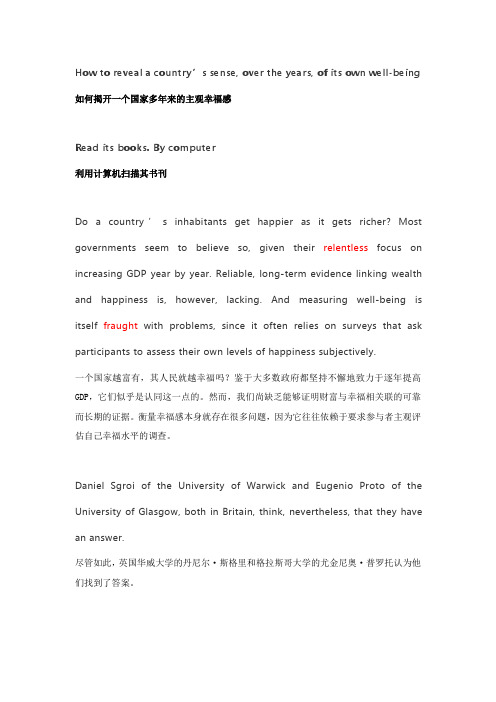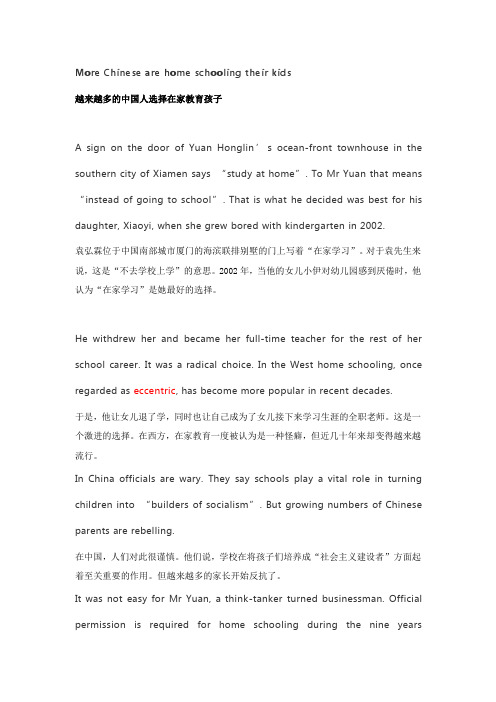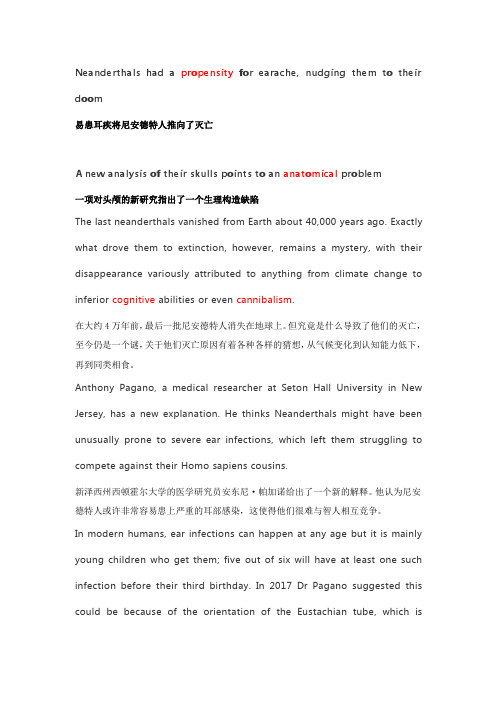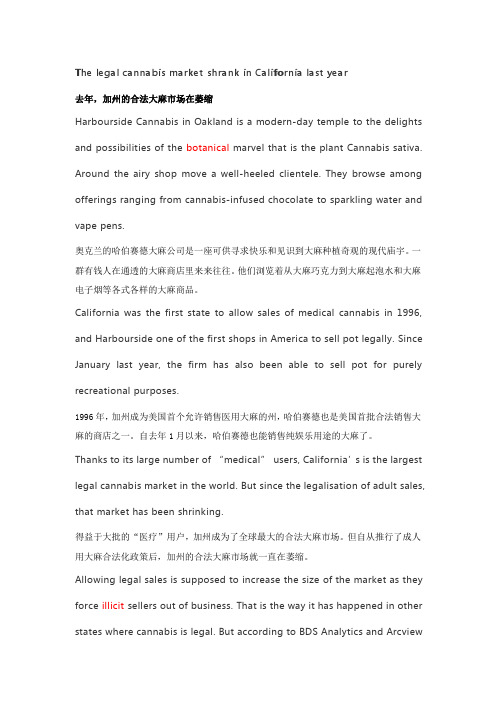经济学人 文章选读 1
2019经济学人考研英文文章阅读一一二

How to reveal a country’s sense,over the years,of its own well-being 如何揭开一个国家多年来的主观幸福感Read its books.By computer利用计算机扫描其书刊Do a country’s inhabitants get happier as it gets richer?Most governments seem to believe so,given their relentless focus on increasing GDP year by year.Reliable,long-term evidence linking wealth and happiness is,however,lacking.And measuring well-being is itself fraught with problems,since it often relies on surveys that ask participants to assess their own levels of happiness subjectively.一个国家越富有,其人民就越幸福吗?鉴于大多数政府都坚持不懈地致力于逐年提高GDP,它们似乎是认同这一点的。
然而,我们尚缺乏能够证明财富与幸福相关联的可靠而长期的证据。
衡量幸福感本身就存在很多问题,因为它往往依赖于要求参与者主观评估自己幸福水平的调查。
Daniel Sgroi of the University of Warwick and Eugenio Proto of the University of Glasgow,both in Britain,think,nevertheless,that they have an answer.尽管如此,英国华威大学的丹尼尔·斯格里和格拉斯哥大学的尤金尼奥·普罗托认为他们找到了答案。
考研英语《经济学人》选读

考研英语《经济学人》选读《经济学人》一直是考研阅读的命题之一,平日里我们可以利用碎片时间稍加阅读一些文章,领会政经类文章的写作手法,适当拓展自己的词汇量,也是不错的练习。
英国禁毒东非的兴奋剂禁令可能会适得其反在伦敦大街南部的克拉彭路的一个报刊亭旁,一个人正叼着卷烟问路人他们是否需要大麻。
但消费者似乎对阿拉伯茶—在俄塞俄比亚人、索马里人和也门人群中颇受欢迎的一种轻度镇定剂。
店里内部,店主拿出少许淡黄色叶片并说明这些是他将卖出的最后一批货了。
“明日之后,再没有这些东西了,”他说。
6月24日,阿拉伯茶的销售在英国被喊停,这距离内政部长Theresa May告知下议院她将下令禁止阿拉伯茶几乎有一年的时间了。
政府认为,由于该叶片已在他处被禁止,如果阿拉伯茶的禁令仍然合法,英国就是在冒险转变至一个交易点,阿拉伯茶成为一种会伤害其使用者的危险致醉物质,同时人们常聚集食用叶片的的“marfashes(提供阿拉伯茶的店)”也逐渐滋生出激进主义。
但政府针对药物滥用的咨询委员会和下议院民政事务委员会的建议都反对镇压。
与一般禁毒令不同的是,禁止似乎更可能意味着对阿拉伯茶的停用。
使用者必须咀嚼大量的在采摘数天后会失去效力的叶片。
这使得走私该叶片变得不合算。
与大麻不同的是,阿拉伯茶在英国很难生长。
禁令之前,货物从非洲空运,而且分布在伦敦希斯罗机场附近的仓库的货物—xx年价值1500万是从肯尼亚进口的。
那样的交易很可能逐渐衰退。
禁令更广泛 * 并不太明显。
一些索马里人和埃塞俄比亚人希望那些咀嚼阿拉伯茶叶的人能利用他们的时间发现更有效益的事情。
禁令的支持者包括那些抱怨他们的丈夫几乎没有停歇的咀嚼叶片的妇女们。
内政部的研究指出了该药与婚姻问题、工作的低出勤率和财政压力的相关性。
不幸的是,人们可能会另觅他物。
以为埃塞俄比亚的侍者说“许多人只在周末、闲聊和看球赛时咀嚼阿拉伯茶叶片,我看到那些在电视上说他们丈夫每日都在咀嚼叶片的妇女们,我想,你们的丈夫缺乏的是自我控制力。
2019经济学人考研英文文章阅读一一四

2019经济学人考研英文文章阅读一二四

Neanderthals had a propensity for earache,nudging them to their doom易患耳疾将尼安德特人推向了灭亡A new analysis of their skulls points to an anatomical problem一项对头颅的新研究指出了一个生理构造缺陷The last neanderthals vanished from Earth about40,000years ago.Exactly what drove them to extinction,however,remains a mystery,with their disappearance variously attributed to anything from climate change to inferior cognitive abilities or even cannibalism.在大约4万年前,最后一批尼安德特人消失在地球上。
但究竟是什么导致了他们的灭亡,至今仍是一个谜,关于他们灭亡原因有着各种各样的猜想,从气候变化到认知能力低下,再到同类相食。
Anthony Pagano,a medical researcher at Seton Hall University in New Jersey,has a new explanation.He thinks Neanderthals might have been unusually prone to severe ear infections,which left them struggling to compete against their Homo sapiens cousins.新泽西州西顿霍尔大学的医学研究员安东尼·帕加诺给出了一个新的解释。
他认为尼安德特人或许非常容易患上严重的耳部感染,这使得他们很难与智人相互竞争。
最新《经济学人》文章阅读精选1

最新《经济学人》文章阅读精选1WHEN Steve Jobs unveiled the iPhone in 2007, he changed an industry. Apple’s brilliant new device was a huge advance on the mobile phones that had gone before: it looked different and it worked better. The iPhone represented innovation at its finest, making it the top-selling smartphone soon after it came out and helping to turn Apple into the world’s most valuable company, with a market capitalisation that now exceeds $630 billion.Apple’s achievement spawned a raft of imitators. Many smartph one manufacturers now boast touch-screens and colourful icons. Among them is Samsung, the world’s biggest technology manufacturer, whose gadgets are the iPhone’s nearest rivals and closest lookalikes. The competition and the similarities were close enough for Apple to sue Samsung for patent infringement in several countries, spurring the South Korean firm to counterclaim that it had been ripped off by Apple as well. On August 24th an American jury found that Samsung had infringed six patents and ordered it to pay Apple more than $1 billion in damages, one of the steepest awards yet seen in a patent case.Some see thinly disguised protectionism in this decision. That does the jury a disservice: its members seem to have stuck to the job of working out whether patent infringements had occurred. The much bigger questions raised by this case are whether all Apple’s innovations should have been granted a patent in the first place; and the degree to which technology stalwarts and start-ups alike should be able to base their designs on the breakthroughs of others.It is useful to recall why patents exist. The system wasestablished as a trade-off that provides a public benefit: the state agrees to grant a limited monopoly to an inventor in return for disclosing how the technology works. To qualify, an innovation must be novel, useful and non-obvious, which earns the inventor 20 years of exclusivity. “Design patents”, which cover appearances and are granted after a simpler review process, are valid for 14 years.The dispute between Apple and Samsung is less over how the devices work and more over their look and feel. At issue are features like the ability to zoom into an image with a double finger tap, pinching gestures, and the visual “rubber band” effect when you scroll to the end of a page. The case even extends to whether the device and its on-screen icons are allowed to have rounded corners. To be sure, some of these things were terrific improvements over what existed before the iPhone’s arrival, but to awar d a monopoly right to finger gestures and rounded rectangles is to stretch the definition of “novel” and “non-obvious” to breaking-point.A proliferation of patents harms the public in three ways. First, it means that technology companies will compete more at the courtroom than in themarketplace—precisely what seems to be happening. Second, it hampers follow-on improvements by firms that implement an existing technology but build upon it as well. Third, it fuels many of the American patent system’s broad er problems, such as patent trolls (speculative lawsuits by patent-holders who have no intention of actually making anything); defensive patenting (acquiring patents mainly to pre-empt the ri sk of litigation, which raises business costs); and “innovation gridlock” (the difficulty of combining multiple technologies tocreate a single new product because too many small patents are spread among too many players).Some basic reforms would alleviate many of the problems exemplified by the iPhone lawsuit. The existing criteria for a patent should be applied with greater vigour. Specialised courts for patent disputes should be established, with technically minded judges in charge: the inflated patent-damage awards of recent years are largely the result of jury trials. And if patents are infringed, judges should favour monetary penalties over injunctions that ban the sale of offending products and thereby reduce consumer choice.Pinch and bloomA world of fewer but more robust patents, combined with a more efficient method of settling disputes, would not just serve the interests of the public but also help innovators like Apple. The company is rumoured to be considering an iPad with a smaller screen, a format which Samsung already sells. What if its plans were blocked by a specious patent? Apple’s own early successes were founded on enhancing the best technologies that it saw, notably the graphical interface and mouse that were first invented at Xerox’s Palo Alto Research Centre. “It comes down to trying to expos e yourself to the best things that humans have done—and then try to bring those things in to what you’re doing,” said Jobs in a television documentary, “Triumph of the Nerds”, in 1996. “And we hav e always been shameless about stealing great ideas.”。
《经济学人》文章精选1

Togetherness in LibyaObama’’s awfully big change in AmericaAmerica’’s use Barack Obamaof forceMar31st2011|from the print edition•Tweet•IT IS Pavlovian.As soon as a president does something new in foreign policy,the world wants to know whether he has invented a new “doctrine”.The short answer in the case of Libya is that Barack Obama has not invented a new doctrine so much as repudiated an old one.What he is also doing,however,is challenging an American habit of mind.The doctrine Mr Obama has repudiated is the one attributed to ColinPowell,the former chairman of the joint chiefs of staff and George W. Bush’s transparently miserable secretary of state when America invaded Iraq in2003.That held,among other things,that America ought to go to war only when its vital interests are threatened,when the exit strategy is clear,and when it can apply overwhelming force to ensure that its aims are achieved.Nothing could be more different from the account Mr Obama gave Americans on March28th of his reasons for using military force in Libya.He does not believe that America’s vital interests are at stake(though some“important”ones are);the exit strategy is not entirely clear(Colonel Qaddafi must go,but who knows when,and not as a direct result of American military action);and the force America is willing to apply(no boots on the ground)is strictly limited.None of this should be a surprise.In“The Audacity of Hope”,the bestseller Mr Obama wrote as a senator in2006,he set out a theory of military intervention.Like all sovereign nations,he argued,America has the unilateral right to defend itself from attack,and to take unilateral military action to eliminate an imminent threat.But beyond matters of clear self-defence,it would“almost always”be in its interest to use force multilaterally.This would not mean giving the UN Security Council a veto over its actions,or rounding up Britain and Togo and doing as it pleased.It would mean following the example of the first President Bush in the first Gulf war—“engaging in the hard diplomatic work of obtainingmost of the world’s support for our actions”.Related topics•United States•Libya•Barack ObamaThe virtue of such an approach was that America had much to gain in a world that lived by rules.By upholding such rules itself,it could encourage others to do so too.A multilateral approach would also lighten America’s burden at times of war.This might be“a bit of an illusion”, given the modest power of most American allies.But in many future conflicts the military operation was likely to cost less than the aftermath: training police,switching the lights back on,building democracy and so forth.The president,it now emerges,remembers exactly what he wrote.He hesitated about whether to act in Libya(just ask the French and British, who egged him on but came close to losing hope),but he was always clear about how.All the conditions he wished for in that book five years ago have come to pass.In this week’s speech he ticked them methodically off:“an international mandate for action,a broad coalition prepared to join us,the support of Arab countries,and a plea for help from the Libyanpeople themselves.We also had the ability to stop Qaddafi’s forces in their tracks without putting American troops on the ground.”Under such circumstances,he said,for America to turn a blind eye to the fate of Benghazi would have been“a betrayal of who we are”.Why does this theory of intervention,and the noble sentiment attached to it,fail to qualify as a“doctrine”?Because it is too elastic to provide a guide to future action.Would America“betray”itself by turning a blind eye to atrocities under different,less favourable,circumstances?So it seems.It has,after all,done so before,in Rwanda and Darfur—and Mr Obama appears to accept that it might have to do so again when,say,an alliance would be damaged,as in Bahrain,or the job is too hot to handle, as in Syria or Iran.Also unclear is whether an American interest must also be at stake before Mr Obama invokes the moral case for action. Conveniently(for the purpose of selling this particular war),the president detects a“strategic interest”in preventing Colonel Qaddafi from chilling the wider Arab spring,so nobody knows.In fairness,elasticity is not a sin;and Mr Obama does not claim to have invented anything he calls a“doctrine”.The worst you can say about his approach is that it is merely commonsensical:decide the issues case-by-case while holding some idea of values and interests in mind. Many who say they want more consistency than this(typically by askingsome variant of“What about Zimbabwe?”)do so not because they really believe that foreign policy can be run by an algorithm but in order to embarrass Mr Obama in any way they can.Prize chump in the case of Libya this past fortnight has been Newt Gingrich,the Republican presidential hopeful who demanded consistency,called for intervention and turned on a dime the instant Mr Obama answered.After you,SarkoMore significant,however,is that habit of mind.In Libya Mr Obama is challenging the assumption of global leadership America has taken for granted ever since the second world war.America has joined coalitions before,but never under a president quite so adamant that America is not in charge—even if the military burden-sharing is indeed a bit of an illusion.Most Republicans and quite a few Democrats hate this.Mr Obama’s hope is that America’s low profile will make the war more palatable not only to the Muslim world but also to the economy-fixated voters at home who question whether America can still afford to play its traditional leadership role.What he may soon discover is that modesty extracts a price of its own.By sharing the leadership with others,he has made his policy hostage to the limited mandate(no use of force for regime change) imposed by the United Nations and the limited means of his allies inEurope and the Middle East.It may not be a doctrine,it should not be a surprise,but nobody can deny that it is a gamble.。
2019经济学人考研英文文章阅读一一一

The legal cannabis market shrank in California last year去年,加州的合法大麻市场在萎缩Harbourside Cannabis in Oakland is a modern-day temple to the delights and possibilities of the botanical marvel that is the plant Cannabis sativa. Around the airy shop move a well-heeled clientele.They browse among offerings ranging from cannabis-infused chocolate to sparkling water and vape pens.奥克兰的哈伯赛德大麻公司是一座可供寻求快乐和见识到大麻种植奇观的现代庙宇。
一群有钱人在通透的大麻商店里来来往往。
他们浏览着从大麻巧克力到大麻起泡水和大麻电子烟等各式各样的大麻商品。
California was the first state to allow sales of medical cannabis in1996, and Harbourside one of the first shops in America to sell pot legally.Since January last year,the firm has also been able to sell pot for purely recreational purposes.1996年,加州成为美国首个允许销售医用大麻的州,哈伯赛德也是美国首批合法销售大麻的商店之一。
自去年1月以来,哈伯赛德也能销售纯娱乐用途的大麻了。
Thanks to its large number of“medical”users,California’s is the largest legal cannabis market in the world.But since the legalisation of adult sales, that market has been shrinking.得益于大批的“医疗”用户,加州成为了全球最大的合法大麻市场。
2018经济学人考研英文文章阅读一

Another good candidate would be a government-run plant at Badarpur,less than50km from the middle of Delhi.另一个较好的选择便是位于巴达普(距德里市中心不到50千米)的官办工厂。
According to the Centre for Science and the Environment,a research and lobbying group based in the Indian capital,Badarpur is one of the most polluting power plants in the country.据科学与环境中心(德里的一家调查和游说团体)称,巴达普的电厂是该国污染最严重的发电厂之一。
Earlier this month the government shut it down for ten days as part of a set of emergency measures intended to curb a particularly intense bout of air pollution.本月早些时候,政府为了遏制极端严重的空气污染,实施了一系列紧急措施,其中就包括将巴达普电厂强制关闭十天。
Dr Alamaro has already found some of the decommissioned jet engines he needs to build his first updrafter.Alamaro博士已经找到了用来组建第一个气流上升装置的退役喷气发动机。
Both the Indian and the American air forces have been forthcoming.印度和美国空军都已经给他提供了帮助。
The Indians have offered six retired engines for nothing and the Americans are in the process of approving a further four engines from the Boneyard,an aircraft-storage facility located on Davis-Monthan Air Force Base in Arizona.印度空军已经无偿提供了6台退役发动机,美国海军准备再从Boneyard(位于亚利桑那州戴维斯-芒森空军基地的飞机储存厂)调来四台喷气发动机,目前还在批准中。
- 1、下载文档前请自行甄别文档内容的完整性,平台不提供额外的编辑、内容补充、找答案等附加服务。
- 2、"仅部分预览"的文档,不可在线预览部分如存在完整性等问题,可反馈申请退款(可完整预览的文档不适用该条件!)。
- 3、如文档侵犯您的权益,请联系客服反馈,我们会尽快为您处理(人工客服工作时间:9:00-18:30)。
[2011.05.26]Time for a change 改变的时刻Why a euro-zone finance minister, even a talented one, should not lead the IMF为什么欧元区的财政部长,即使能力超群,也不应该入主国际货币基金组织OFFICIALL Y the search for a new head of the IMF, to replace Dominique Strauss-Kahn, who awaits trial on charges of sexual assault, has barely begun. The fund’s member governments have until June 10th to propose candidates, after which a shortlist will be drawn up. But in practice the race seems all but over. That is because European countries, which hold over a third of the votes on the IMF’s board, have rallied around a single contender: France’s finance minister, Christine Lagarde.原国际货币基金组织(IMF)总裁多米尼克•斯特劳斯-卡恩目前因面临性侵犯指控留监候审。
从正式角度讲,该组织寻找新老板来接替卡恩的工作才刚刚开始。
IMF的成员国政府要到6月10日才会提名候选人,最后候选人名单将随后出炉。
但实际上,这场角逐看似已近尾声,因为拥有IMF三分之一以上投票权的欧洲国家都力挺一个竞争者:法国财政部长克里斯蒂娜•拉加德。
In contrast, emerging economies,which have long argued that the fund should have a non-European boss, have so far conspicuously failed to fix on an alternative candidate. The Americans, kingmakers in this contest, have said little in public but in private seem happy with Ms Lagarde, not least because they hope to keep both the deputy’s job at the fund and the presidency of the World Bank. Barring embarrassments, one French politician is likely to succeed another.恰恰相反的是,新兴经济体一直嚷嚷着该组织应该推选一位非欧洲籍的总裁,但很明显的是,他们至今未能物色到其他候选人。
美国人能够决定该职位最后花落谁家,虽然他们在公开场合三缄其口,但私底下很乐意拉加德当选,其中一个重要原因就是:他们希望继续由美国人担任IMF第一副总裁和世界银行行长(作为平衡,这两大国际金融组织的一把手不会都来自同一国家)。
而且,让法国人接替法国人,也能避免尴尬。
Ms Lagarde has many strengths. She has been a steady and successful finance minister, no mean feat with a boss as mercurial as Nicolas Sarkozy. A lawyer by profession, she lacks the technical background that the IMF’s best bosses have had, but she is a superb communicator, a good negotiator and, by all accounts,an excellent manager. Given the circumstances of Mr. Strauss-Kahn’s departure, the fact that she is a woman is a bonus. It is not hard to see why even Western finance ministers with a low opinion of Mr. Sarkozy have rushed to anoint her.拉加德女士有许多优势。
作为财政部长,她在法国多届内阁中职位稳定、成绩斐然,跟着尼古拉•萨科齐这样善变的老板,这也着实不易了。
拉加德女士本是律师出身,缺乏IMF历届最优秀总裁拥有的专业知识,但她交际能力出众、谈判能力一流,并且据说是一位卓越的管理者。
考虑到斯特劳斯-卡恩先生离开的前因后果,身为女人这一事实又给她加了分。
不难看出为什么即使对萨科齐评价不高的西方国家财长们也迫不及待地美化她。
But it is still wrong. To begin with, the stitch-up, whereby the head of the IMF is a European and the head of the World Bank is an American, is a disgrace. International posts should be filledaccording to merit. And the growth of emerging economies makes it even less defensible.但这还是错误的。
首先,这种IMF总裁来自欧洲、世界银行行长来自美国的搭配本身就不大光彩。
国际组织的职位应该选贤任能,而新兴经济体的发展更让这种组合难以服众。
Not exactly Europe’s moment还算不上欧洲时刻Moreover, the case against appointing a euro-zone finance minister as head of the IMF now is overwhelming. The main issue facing the fund is the euro zone. The fund is supposed to be an impartial arbiter of good economic policy. It is the only organisation likely to force a rethink of the euro zone’s failed strategy towards Greece, Ireland and Portugal. There were already fears that Mr. Strauss-Kahn’s presidential ambitions led the fund to be too soft on Europe. Ms Lagarde has played a central role in forming the euro zone’s response to its debt crisis, and whatever her private views, she has a public record of defending the indefensible. Staggeringly, some Europeans have tr ied to argue that only one of their own can understand their continent’s complex politics; imagine the laughter if somebody had made the same argument for Argentina’s finance minister in the 1980s or Thailand’s in 1997.而且,反对任命一名欧元区国家财长出任IMF总裁的理由也是极其充分的。
欧元区是该组织面临的主要问题。
IMF本身就应该是一个不偏不倚的仲裁者,来评判经济政策得当与否。
它是唯一一个可能促使大家重新思考欧元区在希腊、爱尔兰和葡萄牙问题上所采取的失败战略的组织。
已经有人担心,斯特劳斯-卡恩先生因为想要竞选法国总统,从而导致IMF对欧洲的态度过于软弱。
拉加德女士在欧元区应对债务危机过程中起了关键作用,不论她个人持何种观点,大家都会记得她曾努力捍卫很难捍卫的欧元区。
令人惊讶的是,一些欧洲人试图争辩说,只有欧洲人才能了解这块大陆复杂的政治;试想,如果有人在20世纪80年代和1997年分别为阿根廷和泰国财长如此拉票,将会怎样贻笑大方。
Besides, there are people who could do the job well who do not happen to be euro-zone finance ministers. Stanley Fischer, the governor of Israel’s central bank and former number two at the IMF, has vast experience of international economics and financial crise s. Agustín Carstens, head of Mexico’s central bank and also a former official at the fund, is another safe pair of hands. Tharman Shanmugaratnam, Singapore’s finance minister and head of the IMF’s policy advisory committee, is widely admired for his technical and political skills. Among central banker types, Mark Carney (currently at the Bank of Canada) and Arminio Fraga (formerly president of Brazil’s outfit) have stood out. Admittedly, none of these men is perfect: Mr. Fischer, for instance, is too old under existing rules and had a patchy record as deputy head of the fund. But none of them is as compromised as Ms Lagarde.并且,有些能胜任该职位的人碰巧不是欧元区国家财长。
